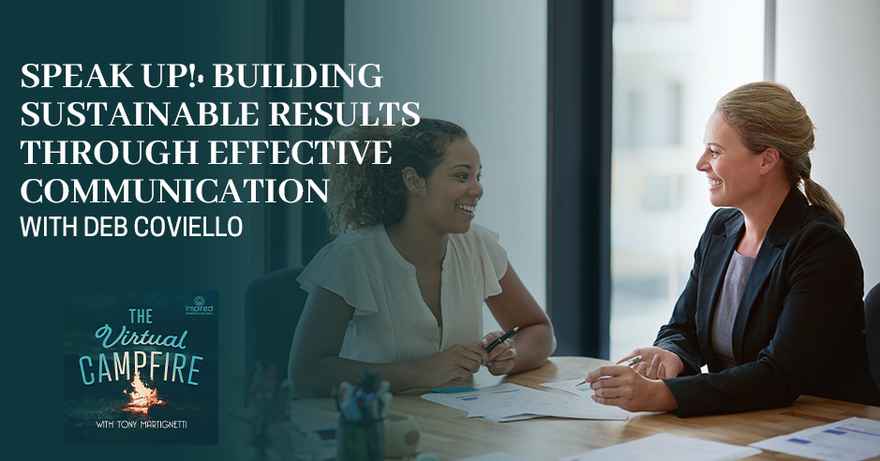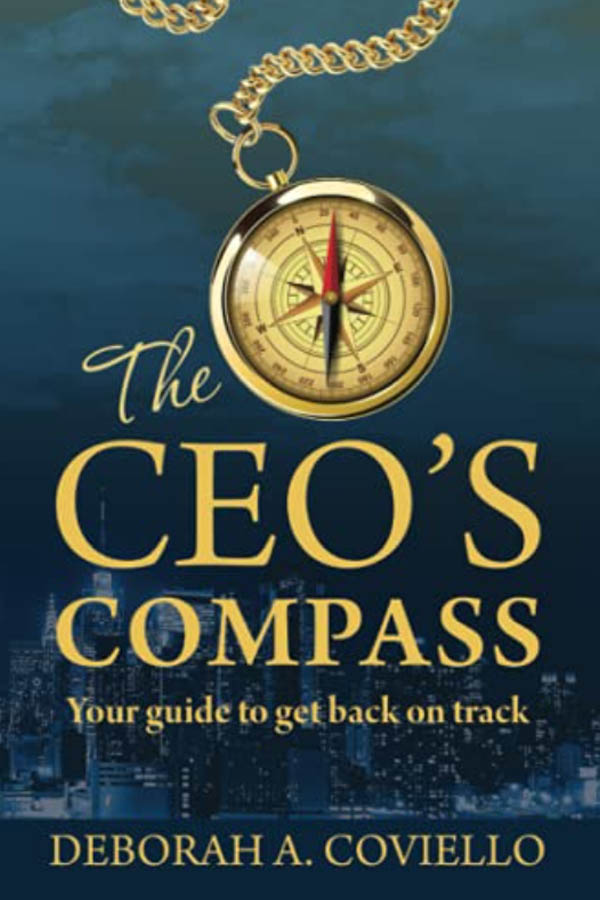Speak Up!: Building Sustainable Results Through Effective Communication With Deb Coviello

Tony Martignetti is uncovering stories by the campfire again. Advisor, author, podcast host, and founder of Illumination Partners, Deb Coviello, takes this round as she shares the flashpoints of a kid that would never shut up. Deb shares the appropriate approach to delivering feedback to ensure a positive impact and insights on what to focus on to get sustainable results instead of just coming up with compliance solutions. Listen in and learn how effective communication can make a difference and how you can empower your team to fulfill the mission of the company.
---
Listen to the podcast here
Speak Up!: Building Sustainable Results Through Effective Communication With Deb Coviello
It is my honor to introduce you to my guest, Deb Coviello. Deb is an advisor, author, podcast host, and Founder of Illumination Partners, a consulting firm for CEOs navigating change and a trusted partner to C-Suite leaders. Deb brings many years of experience in strategy and quality in an operational excellence role combined with her years in the flavors and fragrance industry to support her clients as they work together to identify, assess, and solve the issues that are preventing their business growth.
She's Certified as Lean and Six Sigma Black Belt in Process Improvement. She has developed powerful programs devoted to helping CEOs identify emerging leaders, understanding people are the greatest tool in your toolbox. Deb is a Board Member of the Women in Flavor and Fragrance Commerce, an avid curler with the Cincinnati Curling Club, and a mother of three. She resides in Cincinnati, Ohio with her husband, Dan. I am so thrilled to welcome you to the show.
Thank you so much for the opportunity. You and I have been going back and forth. We've been wanting to have this conversation, and by the way, an amazing conversation on my podcast as well. I can't wait to share a little bit with your audience.
Thank you so much. The feeling is mutual. I'm looking forward to this. One of the things that I enjoy about this particular space is the sense of being able to dive into the story of what makes you amazing. There's something about uncovering stories by the campfire that is magical and heartwarming.
What I like about that as well is that sometimes you guide me on a journey through the story, I sometimes find out things about myself were stories I've never told before. I'm excited to see what happens here.
That sounds interesting. I can't wait. We're going to spend time uncovering your stories through Flashpoints. These are points in your journey that have ignited your gifts into the world. I'm going to turn this over to you and allow you to share what you're called to share. Along the way, we'll stop and see what shows up.
I'm game.
Deb, take it away.
It's one of those things, "Where do you start?" “This is your life." It’s my opportunity to share. When we think about, "Who is Deb Coviello?" I'm the kid that would never shut up. I always had something to say. One would say, "I'm the extrovert," though if you look at my Myers-Brigg, it says I'm an introvert. I always externalize my thoughts and share it, etc. until one day I entered the school system. I was a bright kid, always trying to challenge myself, and then I get my report card and they say, "Debbie is a great student, but she tends to talk too much. Can you keep her quiet?" Flashpoint number one, keeping my voice quiet.
First of all, I can't imagine. That's great to hear that this is the starting point of your journey because now it's like you're speaking and doing all this stuff that is right in line with that.
Here's the thing where I want to go with this because you'll see this as a theme. If you think about the very inquisitive child that's saying, "Why?" verbalizing everything that comes to their mind. They're saying it, creative, love to speak, love to verbalize, and curious. My voice would be favorable or not favorable, and then go into the school system again. We want our children to be the first ones to speak, walk, etc.
I go into high school and I'm in advanced classes. I want to understand math. I'm asking questions, "Teacher, I don't understand." The students again say, “Deb, ask the teacher after school. Stop asking so many questions." I would go quiet again. I see this time and time again throughout my history. I have something to say, whether people like it or not. While society says, "We need you to be more creative, more this, more that," sometimes doesn't like the person that's outside the lines. I could go on and on throughout my career where also I would speak up in my corporate life.
I remember one time I had a different thought than the leaders in the room who were senior to me. I spoke up and said what was on my mind. It was met with dissent. I pulled aside afterward and said, "Deb, you shouldn't have said that." Now, where was the coaching on how to better communicate my message on how I wanted to engage with the world? There was nothing.
What I find is people that who are creative have their own thoughts and society squelches. We don't have the guides or mentors to be able to guide and use our gifts in order to make an impact. I would've loved to have an opportunity to say, "Deb, if you had an idea, this might have been a better way to approach it," such that my voice would not be silenced again. I didn't take as many risks for a few years. I didn't speak up. That keeps happening over and over again.
I've had a great career, but there's a theme here that I want people to resonate with. We have to speak our minds. Don't let society squelch it. You have a voice. People want to hear because if you're thinking and saying it, somebody is also thinking about it needs you to be the leader to speak up and do the messaging.

It takes bravery to do that. It takes that sense of being able to say, "I have the courage." Maybe that's a better word to use here, but the courage to speak up and say that where other people are saying, "I don't know. It's not my place to say that, or maybe I won't say anything.” You're the one who's brave enough to get out there and say it. On the flip side of that, I can imagine along the journey that you've had people say, "You're too much, Deb. You're taking too much space."
I'd like to go there. Again, I know there are a lot of technical people in the audience. To go back a little bit to the boring stuff, I am an engineer. I got a degree in Biomedical Engineering. I then fell in love with manufacturing for which those are my pursuits. I've been in the aerospace industry, electronics, dot-com, and Datacom, and finally landed in the flavors and fragrance arena.
The thing that then what you do sometimes as subject matter experts is honing your craft. I was able to move from a quality engineer to a quality manager, deviating into operational excellence to make things better, faster, and cheaper. What we do sometimes as experts in our technical areas, we get good and we get our certifications, but along the way, what they don't do is there is no education unless you have a great guide, coach, or mentor on then how to message and get all that technical knowledge to be able to speak to the CFO, CEO, or director.
I find so often in this journey that we are providing ourselves and being technically very confident, "We need to replace this equipment, otherwise we're going to start getting more customer complaints." When we hear crickets, deflection, or that's not in the budget, it's very frustrating. That's another moment in time where we don't teach our amazing technical leaders about influence versus presenting amazing technical content.
You bring up a great point here because there's a sense of wanting to connect technical prowess with the ability to speak up and have the courage to say what needs to be said at the right time. Even in the face of adversity too, because there's a sense of pushback that you get that's so important. Again, I say bravery because there's a sense of being brave in that adversity.
Thank you for that. One of the things I often then coach others on is, as technical experts, we do have to dot our I’s and cross our T’s. "Here is the data. Is it good or bad?" One of the things I found that were missing when I coach others and this might be useful for the readers, is when we're positioning information, the outcome is not regurgitated and say, "I gave you the information. Didn't you see it in the chart? Isn't it obvious we need to move forward?" We don't teach people how to message and what outcome we want to achieve.
I find when I add a few simple tips of, "Here's the data. Is it good or bad? Is it going up or down?" What is the impact, the risk, or the opportunity? That's the language that more resonates with a C-Suite leader. What is the magnitude if we do or do not take advantage? Is it a loss of $300,000 in sales or a loss of revenue because we potentially lose a client? We need to help some of our leaders along the way.
Again, if you're not told to do this, people will squelch your voice and you'll go quiet for a while and don't share your gifts, but if we help leaders to message information then even if you get an argument, even if you get deflection or conversation, you've at least delivered something in a way that's like, "They can respond to it." Ultimately, you're seen and respected and maybe somebody to be sought after in bringing in a conversation. Communication and knowing how and when to do it is something that a lot of people can learn from. Again, that's some of the things I've learned along the way.
Communication and knowing how and when to do it are something that many people can learn from.
I want to hear more of the mistakes that you've made along the way or your journey because there's been plenty, but where has your courage and your ability to step out into the open? Have you felt like, "I went too far, or I've gotten myself into this place where I've overstepped?"
Maybe. You can always would've, should've, and could've at yourself like, "I should have said that," but I never want anybody to feel bad because you can always hone your choice of words or how to position something, but I'll go to that situation. It was several years ago and I was a quality engineer. We had to replace me because we were getting ready to expand my role.
Quality engineers are important to be able to have that technical capability. We're working with corporate quality and my boss on what are the job requirements and how are we going to recruit, an amazing conversation. All of a sudden, I spoke first and didn't think, I said, "Wait for a second, isn't this a plant-level position that we should be hiring for? Isn't our interest in what we need in that person important?" They gasped and almost didn't acknowledge me. Again, it was one of those things, "What did I say wrong? It was the truth. We need to meet the needs of the plant and I didn't understand what was corporate quality saying we need in this particular individual. It didn't make sense.”
I felt bad. Almost everybody in that room afterward says, "Deb, you shouldn't have said that." You feel deflated. "What did I do wrong?" What I've learned from that because I didn't get coached was to speak your mind but you have to find a better way to position it. I found this from one of the books over here on power. You will learn that if you have a dissenting view, it is often good to review the information with those stakeholders in advance because maybe you do have the right idea, but they can enrich it or they might say, "Let's show this to them in advance."
Speak your mind, but find a better way to position it.
I could have said something like this, "This is great brainstorming on trying to put together the perfect profile for this person. Have we given consideration to waiting for the needs of the plant a little bit more because in the past we've had problems with that and that little bit of expertise in connecting with people is more important than knowing how to use the Minitab and being an expert in that?" That might have led to a different discussion.
Don't shy away from not saying things and if you feel bad, find ways to figure it out because, in the tech world, it's just data or information. If you take the information and see what you can do differently next time, the impact you have later on, "Now, I know how to position things going forward when you have different views."
I love what you shared because there's something about it that says it didn't stop you from making steps in the future. Don't let one false move or one false event create this sense of, "I'll never do that again," instead, you learn from it, and you move forward from there. That's what a lot of people need to embrace this sense of, "We're not perfect. We're not meant to be perfect." You learn from these events and you figure out better paths forward. Oftentimes, we don't have all the information.
At the end of the day, we know our craft and what we're good at. I came from a speaking event. We have to give ourselves grace when given an opportunity, a new project, a difficult complaint, or an issue, don't feel like you have to check the box, "I'm not 80% qualified for that. I can't engage or participate in that, " because if you have all of the experts in the room that know this stuff, you're going to be blindsided.
Take those opportunities, even if you're from the outside, maybe you're going to have more questions than answers. Engage in those because you never know. You may be the idiot in the room, that naysayer, and that person that asks the silly question that people will look at you silly, be comfortable with that uncomfortableness, but you may interject something that the collective mindset couldn't. Always value the fact that if you're not the expert, you may be exactly what these teams need. Again, your voice needs to be heard.
Always value the fact that if you're not the expert, you may be what the team needs, and your voice needs to be heard.
I love what you said because there's something about connecting back to your childhood and that person who's asking questions. It’s having that beginner's mind of saying, "I don't have all the answers, so I'm not afraid to ask the question. I have the courage to do so." I'm going to raise my hand and maybe look like a fool. In my mind, I want to understand. The reality is that 90% of the people in the room don't understand.
Asking why and seeking to understand has served me well because we come in with our biases, our world, our perceptions, and our values. As soon as your body gets squishy like, "I don't understand. This doesn't feel right," we got to listen to that language. It's meaning we don't have context. When I was the head of quality and we would acquire new plants and have to integrate them and the people to come with, they have a different culture and a different heritage, but I spend more time going to see these people and asking, "What made them special? Why did we acquire them? What are their hidden gifts? What is it about this culture that works?"
I found when I did that, one, they appreciate that you asked them questions because everybody's going so fast trying to integrate you into the portfolio or projects. We never take the time to get to know humans. You will find that because we cared, they will respect you. They will feed you information that you don't know, and over time you'll learn why they act in a certain way. Why might they be risk-averse? We as leaders need to not only be able to speak up but also develop amazing listening skills. Again, as technical people, it's data. Speaking and communicating and listening go hand-in-hand. We got to hone that skill because when we do speak, we will be wiser.

I want to get back into your story because I feel like there are more flashpoints to be had, specifically getting into the work you're doing now. Which ones are most real for you right now that you want to share?
I have been let go from several companies many times and immediately we go to a place of, "What did I do wrong?" We never give ourselves credit for what we did right. I also want to talk to your readers about needing to be true to ourselves. What is our technical craft and who we are as a person? If we're the White person that asks why or the silent observer that only gives our information when necessary, don't change who you are.
If you try to flex to the environment, sometimes you're going to get lost in the shuffle. This was tough. I was let go from my last job. I had the dream job and also the dream nightmare because it was so challenging. I took on the responsibility of being the head of quality and the head of food safety. We have to be careful about the brand that we serve and we don't hurt people in the process because flavors go into consumables that people ingest. A lot of responsibility there.
It was the job I wanted. It was the job that I grew into that I realized helping others be better leaders and removing barriers came into my own. I was stepping way out of my comfort zone. At the end of the day, when we parted ways, I said, "What did I do wrong? What could I have done better?" You could always doubt yourself, but I looked back and said, "What did I do for the people?" I built a team. We moved from number 4 to number 2 out of 4 regions. We moved up these people. Almost all of them have been promoted. The legacy that I've led for them and I have been amazing, and then I realized something changed. Again, it's not good or bad, but I was changing.
I was changing and I wanted to say that I can serve better by elevating leaders in addition to solving technical things. It was probably the best thing in my life to then be on my own to reflect and realize what was I good at, but also what was I passionate about. Take that pause in my life to not always be doing and realize, "Do I continue or do I change direction?" That was probably one of the biggest things for which I don't look back. It was amazing.
I'm going to play with this because there's something about this that is powerful. Before you could like close a chapter and move forward and say, "What's next?" You had to look and reflect back and say, "I appreciate, recognize, and see what has happened to lead you to this point." Show that gratitude for the journey and then take that full move forward with those insights. It's like backward to move forwards.
I did look backward and I learn that there are things that I could have done better. I look back and I was the right leader to rebuild an organization that was performing. One thing that I saw in my leadership that now I look forward to helping other leaders is that we were getting into a pickle. It was rather stressful with the number of issues happening.
Despite my strength in organizing, project management, and mobilizing the forces to solve issues, I didn't pause and realize it got to be too much. I didn't have the courage to ask for help sooner and for more help and ask better questions of my boss and maybe them asking Deb, "How are you feeling?" It was one of these things that I felt like I was on an island and despite all of my energy and effort, the work at hand was too much.
I also said to myself in the future, "Don't be an idiot. Don't try to be the smartest person in the room." When faced with a new opportunity or challenge, look around the room, "Who do you have, and do you need more?" I see C-Suite leaders all the time, they know they're going through some transformation. They might be starting to feel uncomfortable. "I need some more help. I need a coach. I need an external expert." They wait too long until they go from a place of uneasiness and chaos. "I'm surviving another day," to a crisis, losing customers, defects, late orders, etc. If you're starting to get into a role that's too big, stop, ask for help, and raise your hand. It's noble. It's a big learning for me and I ask for a lot of help now.
If you are starting to get into a role that's too big, stop and ask for help.
There's something about what you shared, which makes me think about quality in its own right. In the field of quality, I'm no expert but CEOs don't necessarily spend the time, or not a lot of them at least, to have the quality check in place to make sure that they're looking at their systems in advance to make sure that they know, "Do I have my safety engine or my safety gauges on?" Checking those things from time to time instead of moving forward. With quality, the main purpose is to make sure that you're monitoring where things are.
There's a lesson to be learned about that. In the field of quality, you certainly appreciate those quality experts in place because they'll say everything is running well. It's a compliance function. We're the people that say, "We're good to go." We're also the people that say, "No," and you don't like to hear a no, but if you think about the thing, it's about ensuring the sustainability of what we do in service to others.
You want to know that every time we make a widget or design something, it's going to perform as expected. We put together those systems in place. Another thing you need to think about as a leader is if you have quality testing, etc. and they say, "We went through protocols A, B, and C. We audited it and everything's working." I will say, "Don't trust."
Trust but validate. You need to pressure test things. You need to infuse a defect or a scenario into your systems because ultimately as a leader of a technical organization or the head of an organization, the outcome is that you need to be able to sleep at night and not get that phone call in the middle of the night. You need quality, but understand the essence and be able to be assured that it always works. Test it, check it out, triage what worked and didn't, rinse and repeat, and approve your process. That's what quality is meant to do. It's peace of mind.
Test it, check it out, and triage what worked and what didn't. Rinse and repeat and approve your process. That's what quality is meant to do. It’s that peace of mind.
That's why I started thinking about this sense of how we give the CEOs more that peace of mind so that they're not constantly feeling this sense of, "I'm running and then I'm completely burnt out?"
That's a big area. This is one of my a-ha moments and a flashpoint. The CEO's Compass: Your guide to get back on track is my book, but it's one of those things that I learned over time. When a senior leader of a department is focused on the results, you can beat your people into submission, and process improvements. You can get the results, and everybody high fives, is exhausted and relieved. What happens when the environment changes or something new happens and you're no longer getting the results?
You run in that hamster wheel. You assemble the teams. You beat the team into submission until you get the results again. Had you asked, "What do we need to sustainably maintain these results? What's missing? What's the gap?" What I propose to leaders is that they are in pursuit of peace of mind, not necessarily the results.
What does peace of mind look like? That's personal but have you ever looked at your team where you didn't have to assemble the team, and they immediately rolled up their sleeves, called in whomever they needed, and solved an issue? You know you have as a leader built confidence, competence, capability, and the capacity for the team to operate and fulfill the mission of the company. You can look at that and have peace of mind.
Our job as leaders is to make sure what are the gaps people have in either their technical capability or their competence or soft skills in order to achieve those results. That's what leaders need to focus on. As a leading indicator, close those gaps. The team is smart and they'll get the work done. That's what we need to do. You are focusing on true peace of mind up the northernmost point of the compass. That is another flashpoint. When you focus on that, you will get sustainable results and have more time to do the things you love to do.

I feel like we naturally went here. It wasn't like I intended, but this was exactly where I wanted to go, right into the book. I do want to go to something else right now. You've been on quite a journey and I want to ask, what are the lessons you've learned about yourself in this journey that you haven't already shared?
I'll start with a technical response. Being in operations and manufacturing, my craft is about delivering results. With project management, organizing, getting a particular number, and leveraging my Six Sigma and Lean tools, I can help teams get results. You go out and say, "I can do that easy for other clients. I'm going to find these clients and I'm going to serve them." When did they ever teach us about networking, business development, referral partners, et cetera? Never. It wasn't a skill on the other hand.
First of all, I have had to learn how to network, pull out my child, be the extrovert, and be myself so people know what they're dealing with. It's also so vital in building all of those relationships because now that I'm on the outside building a business to find the people or individuals I can serve, I never understood what it was to build a funnel, a community, or an ecosystem of people that I may not need now, but it's good that them because I will need them later.
It's hard when you're within an organization or entity, but I have learned a lot about relationship marketing. It's not always about the transaction and, "Can you get me that report?" We have to spend more time building relationships. Don't go for the transaction. You and I are creating content for other people to ensure you never know where it's going to go.
I have learned so much about myself to trust who I am that I am likable, I will flob my words, and I will make mistakes, but I'll go with it. I've learned about networking, business development, and being patient with people. I've learned so much about building my business, but all of these skills can also be brought back into the workplace.
That's powerful. What you shared is one of the things that we should be bringing more of that into our curriculum as students. I don't know if that's possible, but it's something that is hard fought to learn those things. We also have to learn to adapt to the ever-changing nature of it because you learn the technical skills of your work and you say, "If I continue to do this, I can continue to be successful." You then realize that people are not constant. We are ever-changing and imperfect. The nature of relationship building, networking, and everything around that is always evolving and changing.
It is volunteering to help, "I ran this project well. We did some spot training." You meet somebody else in another business unit and like, "I see you're struggling. Can I sit in maybe observe and help you out?" I spoke to a wise person and I hope to bring him on my podcast. He talks about the 70/30 rule that 70% of the time, be in your role, hone your craft, and do your best work, but seek those opportunities up and sideways to do something outside your comfort zone. You'll learn new skills and you will be seen and respected. You may find that rather than pushing your way into the next opportunity, you may be pulled by somebody that sees you. It's so much easier to be asked than to try to knock on doors and try to make things happen.

What I often say on the show and I've said it elsewhere is the old saying, "Success is where opportunity meets preparation," but you have to add one other cog in the wheel, which is connections. That is one part that's such a crucial aspect of bringing that thing together. Your preparation is your schooling and experience, but it's also about making sure you're leveraging the connections in the workplace and externally.
It's been the best thing for me. It's always nice to have a lot of followers and connections and I do offer for anybody that's reading, I would love to connect. If it makes sense, let's talk, and get to know each other because you never know where it can lead or if nothing else, that brief moment in time, we get to know another human, connect with them, and feel good, or maybe at the moment, we can help somebody. That's the joyous work I love to do. I wish I'd networked more, but the network within that will also serve you as well.
We're going to shift gears. We've got one last question. The last question is different. I have to know, what are 1 or 2 books that have had an impact on you and why?
At the deepest darkest time of going through a transition, leaving corporate and deciding to go into my own business, you're lost and not knowing what to do, but I stumbled across an author, Dorie Clark, and listening to podcasts. I am so grateful she was gracious and was also on my podcast, but one book that stood out to me was her book called Stand Out. It simply means to look inside and find what are those gifts that you say, "That was easy," but for everybody else, it's a superpower. How can you bring that forward and be different and be recognized for what you do well?
It's finding ways to stand out, which gave me the courage to stand out and develop the Drop In CEO. I'm a business advisor, but I am the drop in CEO, which differentiates and shows the things I do a little differently. Also, she wrote another book called The Long Game. This one has had a profound impact because as technical people, we want to get instantaneous results for the work we do or impact. That may be so, however, we have to plant seeds and be invested in relationships in the work we do for the long game.
We have to plant seeds and be invested in relationships in the work we do for the long game.
I got one of my consulting gigs from a relationship that I cultivated several years ago. It's a long game, but plant the seeds now, you never know how it's going to come around and help you. It's had a lot of impacts because when you feel so strongly about what you do when you feel those values coming through, these books encourage you to keep going if it feels right.
First of all, I love the way you brought that to life. Dorie is fantastic. She was a guest on this show, and she's been a huge inspiration. She’s somebody who's been a mentor to me as well. The way that you brought it to life was powerful because there's this sense of, "You have to stand out, but also you have to be in it." You have to ride the rollercoaster because it's not something, you're going to have that instant success. You have to continue to show up every day. I know that well and I know you do too. I love what you shared.
We're in it. You and I need to support each other because we don't always see the result. Maybe look a little bit differently. Are we starting to feel an impact? Are we starting to see the leading indicators of people like downloads of your show? That's a leading indicator that we're doing the right thing. Always think of leading indicators, not those lagging indicators of financial or other things.
I totally agree, there's a sense of, "What are you measuring?" It's measuring the moments and conversations that have had an impact on people, the little things that you can look back to and say, "That was me and my power. That was me standing out." Those are the moments you look at and say, "I'm doing what I'm supposed to be doing." I can't thank you enough for this conversation. This was beautiful and I feel like I'd want to continue this, but we have to come to an end. Thank you, Deb.
It was an amazing conversation. You took me places I did not expect, but thoroughly enjoyed it and look forward to connecting with your readers. Thank you for the opportunity.
Before I let you go, I want to ask where is the best place we're able to find you?
Two places I play, but there is my website, DropInCEO.com for all my blogs, podcasts, and other resources, but connect with me on LinkedIn, Deborah A Coviello The Drop In CEO. I'd love to connect and have a conversation with you. Thank you again for the opportunity.
That's a wrap, my friends. Thank you so much for reading this conversation, and please reach out to Deb and pick up her book, The CEO's Compass. It's fantastic and you'll get so many great insights. We'll see you next time.
Important Links
- Illumination Partners
- The CEO's Compass: Your guide to get back on track
- Stand Out
- The Long Game
- Dorie Clark - previous episode on Deb’s podcast
- Dorie Clark – previous Episode
- Deborah A Coviello The Drop In CEO – LinkedIn
About Deb Coviello
 Deb Coviello is an advisor, author, podcast host, and Founder of Illumination Partners, a consulting firm for CEOs navigating change.
Deb Coviello is an advisor, author, podcast host, and Founder of Illumination Partners, a consulting firm for CEOs navigating change.
A trusted partner to C-Suite Leaders, Deb brings 30+ years of experience and strategy in Quality and Operational Excellence roles combined with her 20 years in the Flavors and Fragrance industry to support her clients as they work together to identify, assess, and solve the issues that are preventing their business growth.
Certified as Lean and Six Sigma Blackbelt in Process Improvement, she has developed powerful programs devoted to helping CEOs identify emerging leaders, understanding that “People’’ are the greatest tool in your toolbox.
Deb is a board member of Women in Flavor & Fragrance Commerce, (WFFC), an avid Curler with the Cincinnati Curling Club, a mother of three, and resides in Cincinnati Ohio with her Husband Dan of 33 years.


0 comments
Leave a comment
Please log in or register to post a comment